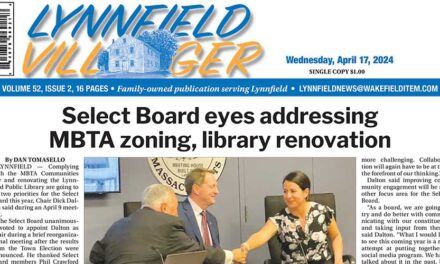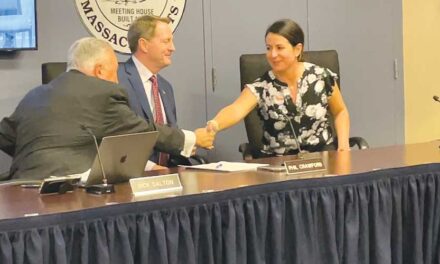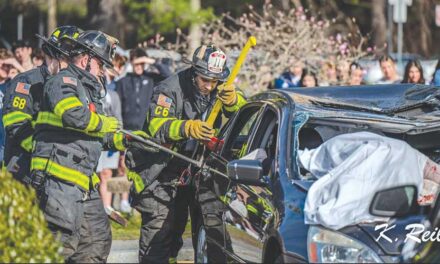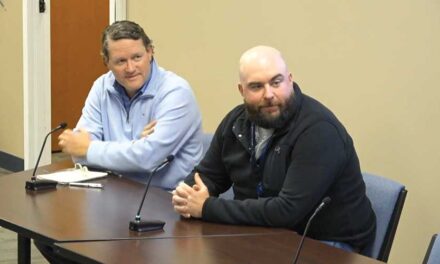Published in the October 26, 2016 edition
By MAUREEN DOHERTY
LYNNFIELD — It is said that patience is a virtue. For the 135 voters who turned out for the second session of October Town Meeting last Thursday at 7:30 p.m., their patience eventually paid off.
Heeding the advice of Town Moderator Arthur Bourque when the meeting was still 40 voters shy of the required 175 voters at the appointed hour, they stuck it out for an extra 40 minutes. Some called friends and neighbors to remind them that half of the warrant articles remained to be acted upon. By 8:10 p.m., the meeting was underway and the voters efficiently dealt with all six articles in just 36 minutes.
Town Meeting had been adjourned the previous Monday night after a quorum challenge was called by Bob Miller of Fernway. A quorum count revealed that 166 voters remained in attendance after the first six articles had been acted upon, therefore Bourque called for adjournment shortly after 9 p.m.
No motions to reconsider any of the business completed on Monday night were raised at the second session.
Action was taken on these final six warrant articles:
Article 7
Under Article 7, to increase the daily fine issued to those who violate any of the town’s zoning bylaws to $300 per day, up from the $100 fine per day in effect since 1977, passed after being amended on the floor by Planning Board co-Chairman John Faria.
Faria sought elimination of a provision in the proposed bylaw change that would have given the building inspector sole discretionary power to decide if the violation should be treated as a “non-criminal disposition.”
This provision is allowed under MGL Ch. 40, sec. 21D, however, Faria argued, “I don’t think we should be having any official deciding whether or not a zoning violation is going to be treated as either a criminal violation or a noncriminal violation. If I’m a friend of the zoning enforcement agent, meaning the building inspector, it’s going to be noncriminal. If I happen to be on Facebook and noted that he has unfriended me that day, and I violate a zoning law, it’s going to be treated as criminal.”
Faria also pointed out that criminal cases must be proven “beyond a reasonable doubt” but weaker cases against an alleged offender might be categorized by that zoning official as noncriminal, in which case the standard of proof would only be by a “preponderance of the evidence.” Deleting this language, Faria said, would continue the practice of treating all alleged zoning violations as criminal cases, thus ensuring everyone continues to be treated the same. A two-thirds majority was required to pass the article and it received a unanimous endorsement.
Article 8
Article 8 passed unanimously to allow the town to petition the state Legislature to require the MBTA to allow the town to maintain culverts under the railroad bed within Reedy Meadow at the town’s expense to help alleviate perpetual flooding issues in the vicinity of Perry Avenue and Wirthmore Lane neighborhoods.
Selectman Dick Dalton explained that this maintenance issue exacerbates flooding issues during major storm events in the neighborhood. By passing the article, the town would be permitted to access the MBTA land and pursue a special act of the state legislature to purchase insurance that would protect the town from possible contamination of the soil underneath the rail bed when working on the culverts and possibly opening up the channel.
Ed Baud of Dale Road urged passage of the article. “The Beaver Dam Brook goes right by my property,”Baud said, adding, “the problem is the railroad bed acts like a dam and I have seen the water spill over the railroad bed. It amounts to a two-foot difference in the level of the water on the Main Street side of the railroad bed. It effects about 25 or 30 homes. I’d like to thank the selectmen for putting this on the agenda because it is a very important thing for our neighborhood.”
Article 9
Residents who fail to license their dogs by March of each year will no longer be faced with an additional fine of $10 per dog, thanks to the passage of Article 9, which proposed a change in the town’s general bylaws by Town Clerk Trudy Reid, whose duties include issuing dog licenses.
Town Administrator Jim Boudreau explained that the cost to license a dog is either $10 (for spayed or neutered dogs) or $15 (for unsprayed or unneutered dogs), therefore, trying to charge residents a fine that is equal or nearly equal to the cost of license “causes a lot of issues in the clerk’s office.” Boudreau added it amounts to about $600 per year.
Article 10
The voters unanimously agreed to transfer $150,000 from Free Cash to pay for engineering services for improvements sought under the town-wide recreational fields program by passing Article 10.
During the discussion on this article, Bourque recused himself from the position of town moderator so that he could speak about the matter as the chairman of the Fields Committee. David Basile was nominated and voted to serve as acting town moderator just for Article 10.
Bourque explained that in the past few years the town “has spent about $8M” on fields throughout town. “I want to thank the voters for that opportunity. The fields at the high school and several other fields have been reconditioned and are in great shape.” However, due to issues encountered during construction “that did not allow us to get everything done.”
Some examples, Bourque said, was discovering that the all purpose field at Huckleberry Hill School could not simply be “slice seeded, it needed to be completely removed, it needs an irrigation system, it needs a well.” Therefore, the scope of work has increased for that portion of the project to about $30,000, he said. Additionally, the DPW has determined that the playground surface at the school cannot be repaired so it must be resurfaced. The Summer Street School has similar problems, he said, including the youth softball field. They also discovered that the well at the school is not a deep well, as they had been told, so that will add an additional cost. Since the cost to repair the grounds at both schools exceeded the appropriation the work has been held off.
The four tennis courts at the high school are also in worse shape today than they were when evaluated in 2012 when it determined that they could be resurfaced. “They are no longer repairable. They need to be removed and replaced,” Bourque said. The tennis courts are one project that would need to be done sooner rather than later as they are pretty close to being “unsuitable” for team and tournament play.
Bourque said the original proposal did not include any improvements to Jordan Park, which is estimated to cost about “$700,000 if Town Meeting decided to do that.”
“The work that wasn’t done as part of the original budget probably amounts to $100,000. Because of the things we’ve discovered, there is about $200,000 worth of work that really needs to be done to complete the project as we originally scoped it.”
“The $150,000 would pay for Gale Engineering to engineer a solution that we would put out to bid in March or February of next year and would come back to Town Meeting in April,” Bourque said, adding they’d like to return to town meeting “with a schedule of what could be done, what those costs are and let town meeting decide what they want to do and what they would like to prolong” for a year or two.
Lanae DiSilvio, 72 Pine Hill Rd., inquired about the state of the middle school track, which she said is “embarrassing,” adding, “I don’t know what is going on with the bleachers, but they are nonexistent at the moment.”
Bourque said the Fields Committee had promised that the funds for the middle school track and field would be raised privately. “We are working on that. We have not raised a substantial amount of money for that yet,” Bourque said, but it is being scoped out so that it can be done in the future. He added that that improvements to the baseball field at the middle school are nearly completed and the surface of the school’s softball field will be replaced.
Town meeting appropriated funds on Monday night to complete the removal of the LMS bleachers, he said, because they were deemed a hazard.
Dick Shafner of Pillings Pond Road said several years ago, a survey of townspeople was taken about about they’d like to see done regarding fields and recreation, and high on that list were walking trails and a dog park. He suggested that if the scope of the project is being changed at this point, he’d like the Fields Committee to find room for a small dog park since the nearest park he can find presently is located in Salem.
Articles 11 and 12
Article 11, to allow the selectmen to establish speed limits of 25 mph or any roadway “inside a thickly settled or business district” provided the change is not done on a state highway and Article 12, to give the selectmen the authority to designate certain roadways as “safety zones” with posted speed limits of 20 mph or less on any way that is not a state highway, were both passed.
Selectman Dick Dalton explained that the authority to grant this power to the selectmen under MGL Ch. 90, sec. 17C was recently granted with the passage of the Municipal Modernization Act by the state legislature and signed into law by Gov Charlie Baker.
Dalton added that the selectmen do not presently have any streets in mind, but provisions both require adoption by Town Meeting to allow the selectmen to consider making such changes “should the need arise.”




